 Petzlover
Petzlover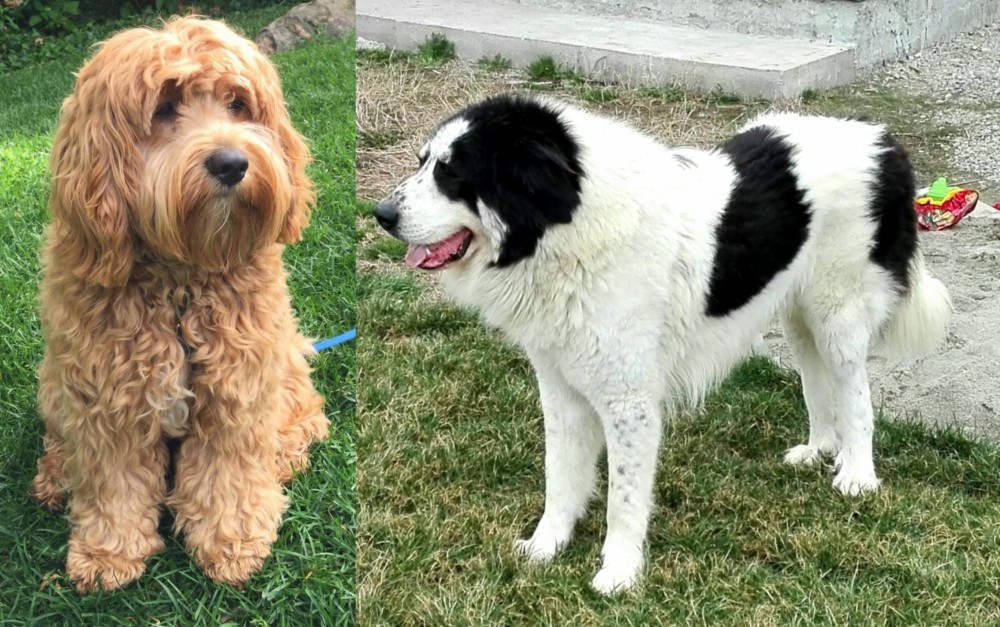 Cockapoo is originated from United States but Ciobanesc de Bucovina is originated from Romania. Cockapoo may grow 40 cm / 15 inches shorter than Ciobanesc de Bucovina. Cockapoo may weigh 79 kg / 174 pounds lesser than Ciobanesc de Bucovina. Cockapoo may live 3 years more than Ciobanesc de Bucovina. Both Cockapoo and Ciobanesc de Bucovina has same litter size. Cockapoo requires Moderate Maintenance. But Ciobanesc de Bucovina requires High Maintenance
Cockapoo is originated from United States but Ciobanesc de Bucovina is originated from Romania. Cockapoo may grow 40 cm / 15 inches shorter than Ciobanesc de Bucovina. Cockapoo may weigh 79 kg / 174 pounds lesser than Ciobanesc de Bucovina. Cockapoo may live 3 years more than Ciobanesc de Bucovina. Both Cockapoo and Ciobanesc de Bucovina has same litter size. Cockapoo requires Moderate Maintenance. But Ciobanesc de Bucovina requires High Maintenance
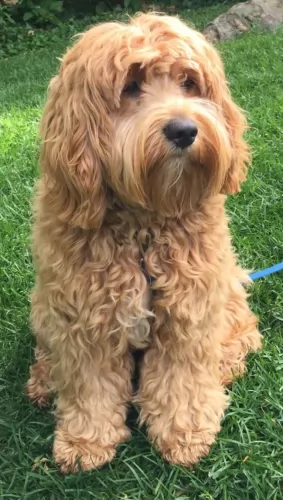 The gorgeous Cockapoo is a mixed-breed dog. He comes from mixing the Cocker Spaniel with a Poodle.Both these dogs have their own histories.
The gorgeous Cockapoo is a mixed-breed dog. He comes from mixing the Cocker Spaniel with a Poodle.Both these dogs have their own histories.
Known as a ‘designer dog’, the Cockapoo has been around since the 1950s in the United States already, although pure-breed associations don’t recognize the Cockapoo. There are some dog clubs that are working to establish the Cockapoo as a recognized breed.The Cockapoo Club of America was founded in 1998.
 The Ciobanesc de Bucovina is a breed that developed naturally in the Carpathian Mountains (Romania and Serbia) and some regions of Bulgaria. The breed was especially useful in the Romanian northeast regions, the county Bucovina and in the northeastern region of Serbia. These dogs are bred for guarding and herding of flocks as well as guard dogs for the family home.
The Ciobanesc de Bucovina is a breed that developed naturally in the Carpathian Mountains (Romania and Serbia) and some regions of Bulgaria. The breed was especially useful in the Romanian northeast regions, the county Bucovina and in the northeastern region of Serbia. These dogs are bred for guarding and herding of flocks as well as guard dogs for the family home.
When the area was split between Russian and Romania, the dog continued to thrive in the mountains because of the need that the shepherds had for this type of dog with the build, working ability and temperament of the Bucovina.
Finally, in the 20th century, Romania began to urbanize and industrialize. People moved to the cities from the hills and many brought their dogs with them. This allowed many non-mountain Romanians to come into contact with the Bucovina Shepherd for the first time. He became a great family dog and offered guard dog protection as well.
The Romanian Kennel Club accepted the Ciobanesc du Bucovina in 1982 and wrote the first standard then. It has since been updated in 2001 and 2002 with today’s standard. They are not accepted by the international clubs nor the big clubs in the US and Europe. This is one factor in keeping the breed rare because it is little known outside of Romania.
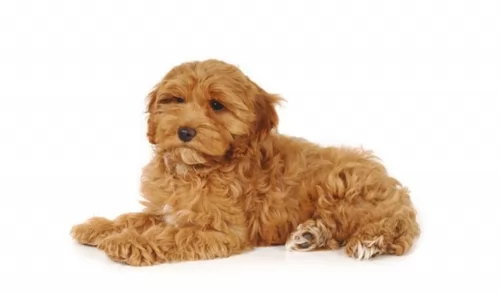 The Cockapoo is a mixed breed- or hybrid dog that has become very popular in recent years. He is a small dog, but robust, and stands between 25 – 38cm in height and weighs between 5 and 11kg.
The Cockapoo is a mixed breed- or hybrid dog that has become very popular in recent years. He is a small dog, but robust, and stands between 25 – 38cm in height and weighs between 5 and 11kg.
The Cockapoo has floppy ears, and the tail has always been docked to give the dog an attractive, distinctive look. Without tail docking, the natural tail is long.
The coat color of cockapoos is varied and can be anything like tan, white, cream, blonde, brown or black and sometimes even a combination of these colors. Cockapoo coats can vary from silky smooth to tight curls, although they usually fall somewhere in between.
He is a low shedder and you’ll often hear him being described as hypoallergenic, which is an advantage for Cockapoo owners who might be allergic to pet hair.
He is small and robust, always ready for a game and is loving, with a sweet, alert expression on his face. Even as an adult, his antics and looks make one think that he is just a big puppy.
He makes a wonderful pet and gets on well with adults and children as well as other pets. He is intelligent and can be easily trained, and when you shower him with attention he is a happy, energetic, social, fun-loving dog who goes out of his way to please you and be the perfect pet.
The personality of the Cockapoo isn’t set in stone and while one dog may be territorial and somewhat aggressive, others aren’t. Many dogs simply turn out according to the way they are raised.
 Most large mountain dogs resemble the Bucovina Shepherd, but this breed is more slightly built and has a lighter coat than most of the mountain dogs. They are still a very large dog weighing in between 70 and 120 pounds. They are powerfully built even if more slender than other mountain dogs. They have a long thick coat that makes it difficult to see how their bodies are formed, but they are a very muscular dog.
Most large mountain dogs resemble the Bucovina Shepherd, but this breed is more slightly built and has a lighter coat than most of the mountain dogs. They are still a very large dog weighing in between 70 and 120 pounds. They are powerfully built even if more slender than other mountain dogs. They have a long thick coat that makes it difficult to see how their bodies are formed, but they are a very muscular dog.
Their large head does indicate how powerful a dog he is, and he has a wide muzzle that tapers off at the end. The breed has small eyes that are either hazel or brown and his v-shaped ears hang downward on the side of his head. He has a wide, black nose and thick, dark lips. His tail is bushy and long.
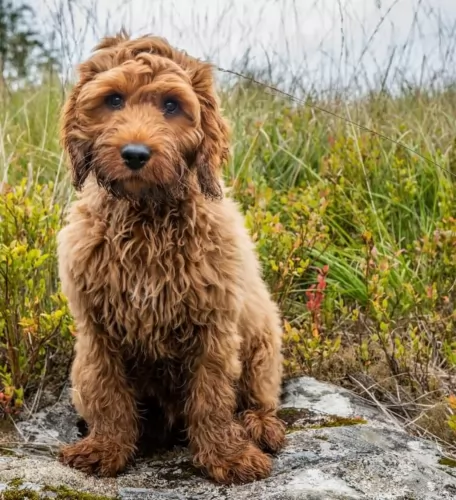 Cockapoos have become popular pets because they have a host of good qualities from both the breeds that make this pet – the cocker spaniel and the poodle.
Cockapoos have become popular pets because they have a host of good qualities from both the breeds that make this pet – the cocker spaniel and the poodle.
They are jaunty, sweet looking, amicable, social, fun-loving, devoted, loyal, loving and low-shedding as an added perk. He loves spending time with his human family and will become unhappy and bored if he isn’t made to feel absolutely part of the family.
Look after your Cockapoo, because when you provide him with good food, you take time to exercise him and you love him to bits, you’ll find that you’ve got in him all the makings of a wonderful friend.
 Bred to herd and guard cattle against the wolves and bears, it is a very dominant, self-assured, breed. They are intelligent yet laid back when no threat is suspected. They love children but can be hard to train. A dominant adult is needed to train and control the Ciobanesc de Bucovina. They are quite protective of their families and will patrol the property if left outside at night.
Bred to herd and guard cattle against the wolves and bears, it is a very dominant, self-assured, breed. They are intelligent yet laid back when no threat is suspected. They love children but can be hard to train. A dominant adult is needed to train and control the Ciobanesc de Bucovina. They are quite protective of their families and will patrol the property if left outside at night.
The breed has a strong mistrust of strangers but loves his adopted family. Unless threatened the Ciobanesc de Bucovina is calm and chilled. He is loyal, affectionate and dedicated. They attempt to frighten strangers with barks and growls but will attack if necessary. They are also very driven to chase prey so make sure they are in a locked fence. They can be difficult to train and seem to need a strong, alpha adult presence.
 The Cockapoo is generally a healthy, good tempered, mix-breed dog and with good care he can live to be anything from 13 – 15 years of age and even older.
The Cockapoo is generally a healthy, good tempered, mix-breed dog and with good care he can live to be anything from 13 – 15 years of age and even older.
Although you’re not likely to find any serious health problems with the Cockapoo, it is wise to know that there are many common dog illnesses that attack any dog, including the Cockapoo. Some of these are hip dysplasia, ear infections, dental disease which can affect other parts of the body as well as eye disorders.
Referring to ear infections, as a long-eared dog, the ears will need to be cleaned with the Cockapoo to avoid ear infections. Simple cleaning methods are explained at the veterinarian. Some eye conditions like progressive retina atrophy are common in both the dogs that make the Cockapoo.
 Not much has been done to study the health of this breed so not much is known for certain. It is known that they have good health as they have survived the harsh winters in the mountains while tending to the flocks.
Not much has been done to study the health of this breed so not much is known for certain. It is known that they have good health as they have survived the harsh winters in the mountains while tending to the flocks.
Given their size and the history of mountain dogs, they could be susceptible to visual and skeletal amount of food and at the right times can prevent this. They could be susceptible to arthritis, knee and elbow dysplasia, and cataracts.
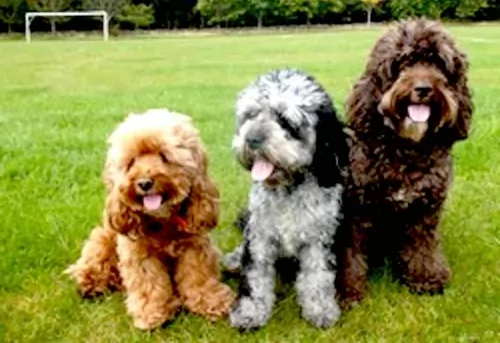 The Cockapoo can have a long, straightish coat or it can be wavy or curly. The coat will need a good brushing at least twice a week to avoid matting. He may well need a trip to the doggy parlor to have his hair professionally clipped.
The Cockapoo can have a long, straightish coat or it can be wavy or curly. The coat will need a good brushing at least twice a week to avoid matting. He may well need a trip to the doggy parlor to have his hair professionally clipped.
What is also noticeable about this dog is that he is odorless too. Bathing him doesn’t have to be a regular occurrence at all, as too much bathing strips the coat of its natural oils, irritating and drying out the skin.
The Cockapoo is an energetic little dog and he will require exercise from you. Make it fun for him seeing that he is a fun loving dog, and take him on walks and have ball games with him.
There are many different commercially produced dog foods, and some of the top quality ones offer an excellent mix of meat, fish or poultry in them with vitamins and minerals.
These top quality foods are usually found at your vet or in special pet stores and are not ordinarily found at the supermarket. Make sure to feed your Cockapoo the right amount of food according to the label on the packaging.
You can also include cooked brown rice, vegetables and chicken into his kibble to give him some variety and give him some raw meat in his diet from time to time. This will help with avoiding skin allergies. Make sure he always has access to clean, cool water.
 It is important not to over feed or to feed to much at one time. Even though they are large and powerful dogs, massive meals can cause bloat, so you are better off with 2-4 smaller meals per day. Also, don’t feed right before or right after strenuous exercise.
It is important not to over feed or to feed to much at one time. Even though they are large and powerful dogs, massive meals can cause bloat, so you are better off with 2-4 smaller meals per day. Also, don’t feed right before or right after strenuous exercise.
As previously mentioned this breed does not appear to have many health issues. As they developed naturally in the mountains they have not been exposed to many things there.
This was already mentioned but it is a very serious condition and requires veterinary assistance immediately under threat of death.
They can have either hip or elbow dysplasia. Can lead to arthritis of lameness.
This is a calm, even tempered dog not needing a lot of exercise. However, he is a big dog and can get obese without daily exercise. A large fenced in yard would be appreciated and a nice brisk walk every day. They would probably enjoy flyball and leurcatch. Any herding or hunting would be enjoyed.